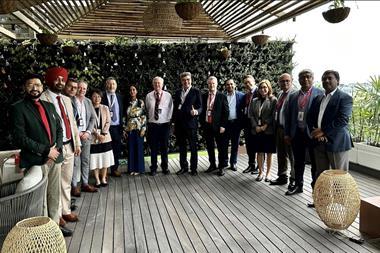New start-up low cost Indian airline POP is aiming to capitalise on new trade agreements between the UK and India sparked by Britain’s decision to leave the European Union.
The new airline, which will donate 51% of profits to social projects, plans to be the first airline to operate non-stop flights between the UK (Stansted) and Amritsar and Ahmedabad.
The services will cater for cargo as well as passengers and the airline is hoping it could benefit from any new trade deals between India and the UK following the Brexit vote.
Chairman & principal and founding partner of POP Navdip Singh Judge said: “The recent talks between the UK and Indian governments about a possible preferential or free trade agreement following the Brexit decision makes us even more confident about the cargo opportunities that POP can look forward to.
“The vision behind POP is one of making a genuine and positive difference to the communities we plan to serve.
“We aim to do that by opening up new routes between the UK and India, by operating on a ‘caring capitalism’ model and by providing new opportunities for growing businesses in Punjab and Gujarat to engage in worldwide trade in a way that has previously been impossible for them.”
The airline is hoping to cater for producers in northern India looking to export a range of goods and produce - fruit and vegetables, including papayas and mangoes, sugar cane, tea from the northern plantations and chicken — as well as manufactured goods, including textiles and traditional Indian clothing.
Ahmedabad, known mostly for its manufacturing of denim fabric and its export of jewellery and gemstones, also produces chemicals, cars and pharmaceuticals and has recently established itself as a biotech hub, with more than 50 biotechnology companies and approximately 66 biotech support organisations.
POP is also hoping to form partnerships with other airlines, allowing it to offer shippers services to and from other areas of the world.
The airline also pointed out that India is engaged in a “Make in India” campaign that it hopes will boost manufacturing and also aims to improve its trading environment and logistics infrastructure.
India recently called for “a robust supra-national supply chain” and announced a list of proposed air cargo reforms, including 24 hour customs processing with paperless systems, the promotion of free trade and warehousing zones and the implementation of air freight stations as well as incentives for the logistics industry such as the granting of ‘infrastructure status’ for companies co-located at airports.
POP currently aims to launch operations during the fourth quarter of 2016.










